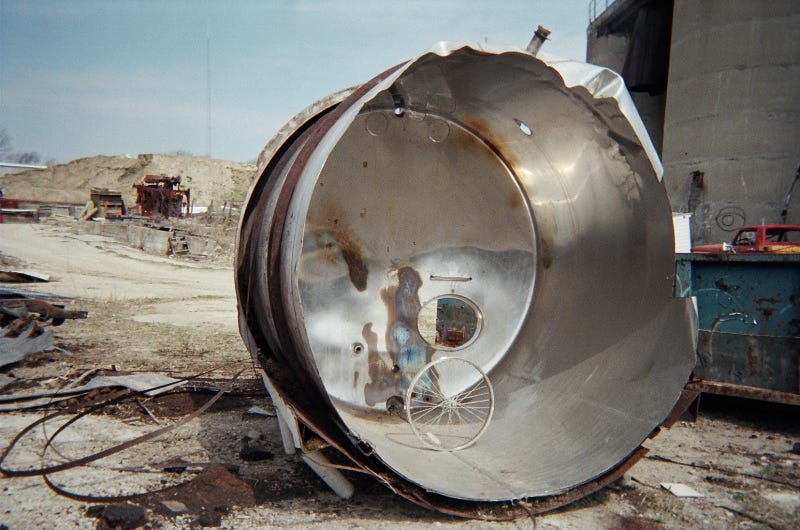Knowing when to quit.
When is a poem "finished"?
Being a poet can be intimidating and grueling. Capitalism doesn’t think the work involved is worth much money, so you have to do it for the love of it, often without any external validation. And it’s quite a process.
First you have to write the dang thing, which involves a lot: Making the time, making the space, and getting the shoulder monster off your back (you know, the voice in your head that sneers and asks you why you’re bothering, who do you think you are, & etc ad nauseam) or at least putting some earplugs in as the monster prattles on.
When you’ve got your poem written, next comes the process of revision—making it into its best self. That can involve anything from cutting it up and collaging it, to rewriting it from memory (a fun trick; the theory is you’ll remember the best parts and lose the rest), to simply working your way through version by version.
Then at some magical point you know when it’s evolved into its best self, and voila, you move on, right? Not so much. At least in my experience, a poet doesn’t determine when a poem is “perfect and finished,” but rather when it’s “good enough for now.”
I believe a poem can never really be "done" in the capitalist sense of being a finished, complete product ready to be offered up. As Paul Valéry wrote...
“…un ouvrage n’est jamais achevé . . . mais abandonné”.
In English: A work of art is never finished, it's abandoned.
To me a poem has nothing in common with a fixed product, and everything to do with the ephemeral flexibility and changeability of the natural world. Like its architect (the poet), a poem is gestated, then born. It grows, it makes its way in the world, and it ages (sometimes in a good way, sometimes in a cringe-worthy way).
Imagine that you revised, revised, revised, then published a poem in 1996 in Harvard Review. Perfect and finished, right? Vetted by top-notch editors, after all.
But now it’s 2024, you’re looking to include that poem in a collection of your poems. Maybe you find that it resonates even more deeply today, that it’s aged with grace and power, and nothing needs to be changed.
But it’s more likely that you’ll realize you could push it further. There are extraneous words to cut, or opportunities to add sonic assonance and consonance. Maybe you notice some outdated language or ideas that no longer resonate with you. Or you see how it could become a clever, biting commentary on current political events if you changed just a few lines.
After having been “abandoned,” the poem has been adopted by a new parent (your own older, more experienced mind). “Done” is relative and always will be. So my first piece of advice about whether a poem is “done” is this:
It probably isn’t. And that’s normal.

Three Helpful Approaches
BUT—if you’re just trying to finish a poem, perhaps to get it ready for submission to a journal or contest, the above advice is not super helpful.
So here are three practical approaches that can help you put the so-called finishing touches on a poem.
Read it aloud to yourself.
This will make it abundantly clear to you if any part is clogged up or clunky or doesn't feel right; you'll be able to spot unnecessary repetition (of words, of ideas, of images) more easily. You'll feel in your body the rhythm or lack of rhythm. It can also help to record yourself and listen back it.
Step away.
Take time away from the poem to let it incubate in the depths of your mind. Don't look at it—for hours, days, weeks, months, or even years. When you return to it, you'll see it with new eyes, catching problems and spotting opportunities that feel completely obvious now but which you couldn't see when you were immersing yourself in it.
Show the poem to another person.
Compare your intentions for the poem with what your reader reports perceiving/feeling. Did your message, vibe, humour, story, or emotion come through? If so, great! If not, adjust as needed.
This week’s poetry challenge:
For long-time writers:
Find a very old poem, something you wrote waaaay back when. It can be more fun if you find a poem that you don’t like very much now that you’re re-reading it, but which you remember having high hopes for.
Read through it several times. Put it away. Now, try to rewrite it. Don’t worry about making it identical – the goal here is in fact to take the essence of the poem and refresh it with your evolved mind, your different context and inspirations.
For new writers:
Choose a poem you’d like to revise. Read it several times, then put it away. Now, try to rewrite it from scratch, using only your memory of it. Don’t worry about getting it “right” – the goal here is to extract the most powerful parts—the parts that resonate with your memory—and leave the rest behind.
Thanks to Brooke for this great question, and thanks to Andrzej for suggesting I make a post about my answer!



